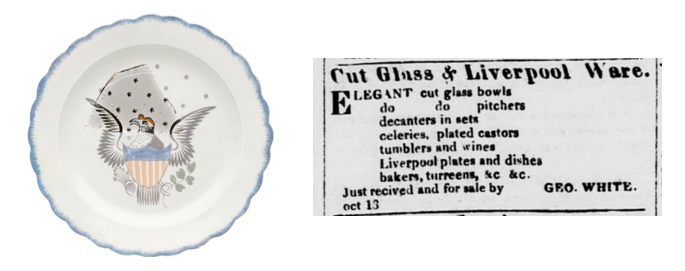Heather Hembrey, M.A., M.A.A.
The July artiFACTS features a sherd that is decorated with a colorful eagle. The complete “Liverpool Ware” pearlware plate from which this sherd remains, featured a stylized, hand-painted American eagle with a shield, arrows, a laurel branch, 13 stars above the eagle’s head and wings, and a blue or green shell-edged rim. The original plate was likely made in Leeds, England between 1820 and 1840. Someone in Centreville, Virginia once owned the plate, broke it, and left this sherd for archaeologists to recover. As with any artifact, this sherd has an interesting history.
People throughout the United States observed our nation’s 50th anniversary on July 4, 1826. They celebrated past Revolutionary heroes and battles and rode the patriotic wave that followed the victory over Great Britian in 1814. English manufacturers recognized the commercial potential for producing ceramics designed to appeal to American buyers. Shipments of dishes and other pieces decorated with American symbols and slogans were exported from Liverpool and elsewhere in England to United States ports, including Alexandria, Virginia. In the November 11, 1830, Phenix Gazette, Alexandria merchant George White advertised his stock of Liverpool Ware plates and dishes.
Liverpool Ware is cream-colored earthenware produced in the 18th and early 19th centuries. Liverpool-type ware refers to creamware and pearlware decorated with historical or commemorative overglaze transfer prints designed for specific national markets. Pieces destined for the United States included images of George Washington, military battles and heroes, patriotic slogans, and symbols of liberty, such as Columbia and eagles. While such pieces were affordable and widely available 180 years ago, today only sherds are preserved in Fairfax County’s archaeological collections.


